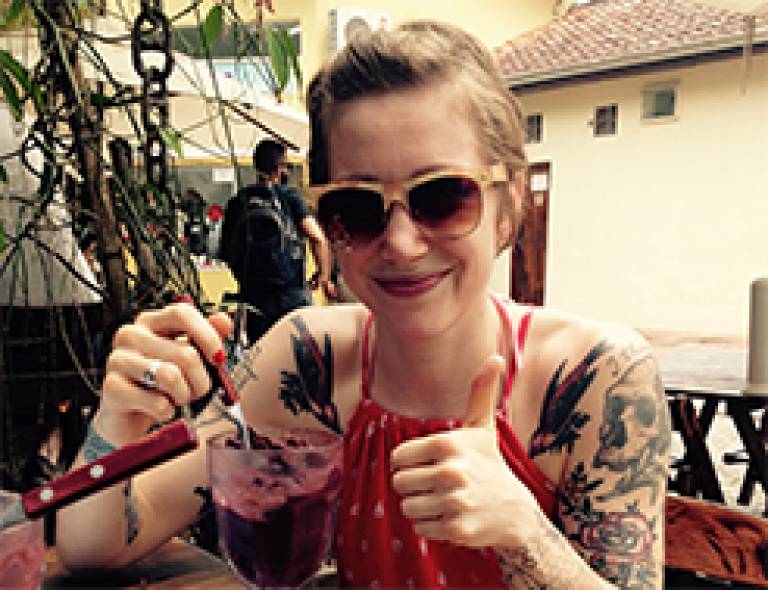7 questions with Meghan Shirley
27 January 2016
This week, we put seven questions to Meghan Shirley, a UCL Biological Anthropology PhD student.

Why are you interested in this subject and what do you plan to do in the future?
I initially started studying biological anthropology because I wanted to be a forensic anthropologist. I'm sure that would have been fun, but over the years, my eyes have really been opened to the depth and breadth of the field, and also the ways in which anthropological thinking can be wedded to other disciplines and generate unique questions and avenues of inquiry.
Anthropological study lets us know and develop an understanding of our past, our present and where we might be headed in the future. I'm hoping I can build on what I'm doing now with research that's shaped by an anthropological perspective and has implications for public policy and modern human health.
What is the most interesting thing you've done, seen or got involved with while at UCL?
Honestly, my PhD project! My MPhil was really great and I enjoyed the hours that I spent in the sub-basement of the Natural History Museum measuring bones for it, but recruiting living people for my current data collection has been a whole new experience.
I've met so many people that I otherwise might not have and, though the recruitment and measurement process is difficult at times, it's really rewarding.
I'm recruiting young women of South Asian ancestry and, just last weekend, I visited a Sikh temple in Southall to make connections so that I can hopefully reach out to some of the women there who may be keen to join the study.
It was a really interesting experience and one I probably wouldn't have had if I weren't doing this project here in London.
If you're a female of Indian, Pakistani, Bangladeshi or Sri Lankan ancestry and between the ages of 20 and 28, you can help with my study - and you'll earn £30 in the process!
Have you discovered any 'hidden gems' during your time at UCL?
I train in Thai and traditional boxing at KO Gym on Globe Road in Bethnal Green, east London. It's under the arches, rough around the edges and the instructors are great.
The Imperial Durbar on Trinity Road near Tooting Bec tube station has beer and cocktails, and they're linked with the Cardamom Club, an Indian restaurant a few doors down.
You use a phone at the Durbar to order the food, and they'll bring it over to you when it's ready - it's probably the best curry I've had in London.
Give us your top three things to do/see/go to in London.
The Genesis Cinema on Mile End Road - they have £4.50 tickets on Mondays and Wednesdays, and really good popcorn.
Cycle around London - I've found it a really fun and unique way to get to know the city. Sometimes it's stressful, but it's worth it. Wear a helmet!
On a Saturday, head down to Bermondsey to the Ropewalk for food carts and antique and second-hand shopping. If you visit the other side of the railway arch, there are several breweries selling local craft beer that form part of the Bermondsey Beer Mile.
If you were Provost for the day what one thing would you do?
I got in touch with people at the UCL Public Engagement Unit in my second year and had a lot of fun getting involved with some public outreach projects.
If I were Provost for a day perhaps I'd try to arrange a large-scale, university-wide day of public outreach, with programmes and events designed to share UCL research and areas of study with the wider community.
Who inspires you and why?
My sister. She's strong, confident and independent, and, at 22, has joined the still male-dominated funeral business where she works very hard as a funeral director. She's six years younger than me, but I really look up to her.
What would it surprise people to know about you?
Before discovering a love for science I was studying criminal justice and psychology with an aim to go to law school and become a criminal defence attorney.
I took a course in a prison near Philadelphia as part of the Inside Out Prison Exchange Programme, where the class was a mix of university students and incarcerated men.
I'm still passionate about criminal justice and I currently volunteer in London with the Shannon Trust, a charity that facilitates a reading scheme within prisons where incarcerated men and women who are able to read teach those who cannot.
 Close
Close

